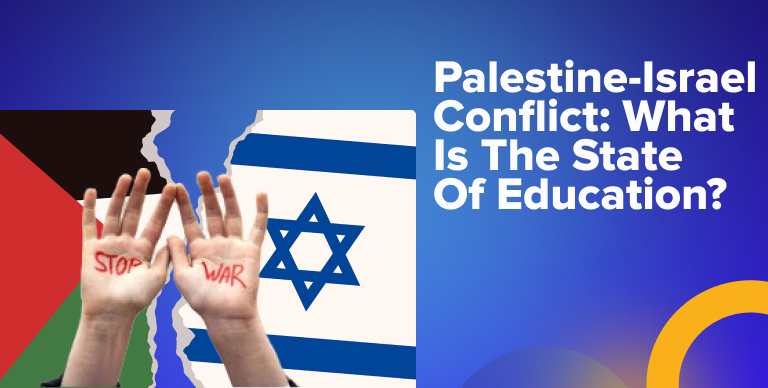Since the beginning of the Palestine-Israel conflict on October 7th 2023, the Palestinian government reports that 439 individuals from the university community have lost their lives.
In Gaza, Israeli security forces have employed air-launched and ground-launched explosive weapons causing harm to schools.
Because of these airstrikes, 11 higher education buildings have suffered complete or partial damage.
This has resulted in significant disruptions to higher education in the region.
The Global Coalition to Protect Education from Attack (GCPEA) identifies Palestine as one of the nations most profoundly impacted by assaults on education in recent times.
How are the Palestine-Israel conflicts affecting education?
In response to attacks by Hamas, areas like al-Karama and Rimal in Gaza have faced heavy bombardment, resulting in a significant increase in civilian casualties, including many children.
The tensions have resulted in a significant loss of life on both sides.
The death toll has now surpassed 15,000 Palestinians, including over 8,000 children, with thousands more injured.
The Palestinian Ministry of Higher Education and Scientific Research (MHESR) reports instances of complete or partial destruction, with some buildings completely demolished.
Numerous Palestinian universities, including the Islamic University of Gaza, Al-Azhar University, and branches of Al-Quds Open University, have suffered extensive damage amid the ongoing conflict.
Israeli forces are said to have entered and damaged Birzeit University in the West Bank, taking flags and belongings from student residences.
The MHESR argues that such actions violate the Fourth Geneva Convention of 1949, which protects civilians in times of war.
Ongoing conflicts and airstrikes have had a severe impact on the Gaza Strip, leading to a blockade that deprives residents of essential resources like food and water.
The destruction of homes in Gaza due to Israeli military attacks has impeded reconstruction efforts, displacing many inhabitants.
Those seeking refuge in UNRWA-run schools encounter additional challenges, as some of these schools have been damaged by Israeli bombings.
One notable casualty is the Education Above All (EAA) Foundation’s Al Fakhoora school, which provided scholarships to Palestinian students and was destroyed in the airstrikes.
The EAA condemned these actions, emphasizing that attacks on civilians and infrastructure violate international humanitarian law and may constitute war crimes.
Palestinian students in Gaza now live in constant fear due to Israeli incursions.
The dire situation prompted the Ministry of Education to implement training programs for schools near Gaza’s borders, focusing on evacuation drills in preparation for potential attacks.
Several Palestinian universities have accused Israeli universities of complicity in war crimes and called on the international academic community to boycott Israel.
Why are certain educational buildings being specifically targeted by Israel?
In war, if an armed group uses a building, residence, hospital, mosque, or school for activities like launching, communicating, or storing, it’s deemed a military target per accepted rules.
The rationale is that it becomes associated with the military objectives of the group.
In the case of the conflict between Israel and groups like Hamas or PIJ, the belief is that these structures, including houses of officers, function as command posts or conceal tunnels.
The strategy is to target these buildings to eliminate tunnels, incapacitate officers and bomb makers, and disrupt the groups’ ability to launch attacks.
Israel views these buildings as having a “dual-purpose,” serving both civilian and military functions.
Contrary to Palestinian claims, the Israeli Defense Forces (IDF) assert that they don’t randomly target buildings without cause.
They argue that their actions are in response to the tactics of groups like Hamas, which indiscriminately launch unguided rockets at civilian towns and cities, constituting separate war crimes with each launch.
Access to education in Palestine-Israel conflicts
The Ministry of Education in Gaza has halted the academic year 2023-2024 for 625,000 students due to the ongoing indiscriminate bombing by Israel.
The airstrikes have led to the displacement of 1.5 million Palestinians, with tens of thousands seeking refuge in schools after being forcefully evacuated from the northern part of the Strip.
In response to the widespread displacement and security concerns, schools in the area have been repurposed as shelters for Palestinians.
Unfortunately, even these safe spaces have not been immune to the bombings from Israel.
Over the past couple of weeks since the start of the war, it has become evident that numerous universities are finding it difficult to manage campus tensions because of limited access to education.
Individuals, including students, faculty, and administrators on both sides of the conflict, are also encountering significant backlash for expressing their opinions.
Efforts are being made to address these challenges by organizing academic panels and teach-ins.
Institutions that seem better equipped to handle these issues typically have pre-existing structures in place designed to foster a sense of community during challenging times.
Wrapping Up
Education amid the Palestine-Israel conflict is seriously affected by the ongoing violence and instability.
The loss of lives, including those in the academic community, and the damage to educational infrastructure are hindering learning and progress.
With universities being damaged and used as shelters, getting an education has become a challenge, increasing tensions and limiting access to safe learning spaces.
Subscribe to our newsletter to learn how calamities such as these affect education systems, and how we can work together to improve intellectual progress in war-torn nations.

